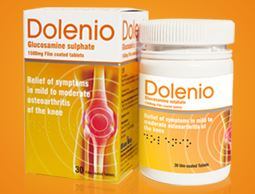The case has provoked a motion in the UK parliament to defend glucosamine and is being closely watched by the broader European supplements sector because of the food versus medicine precedents it could establish across the bloc.
The action has been mounted by the European arm of Chinese company BlueBio (Yantai) Pharmaceuticals, which has a prescription-only medicines registration across the EU’s 28 member states for its glucosamine sulphate product, Dolenio.
Glucosamine is also present as a food supplement (albeit without approved EU health claims for the moment), a situation BlueBio wants to change by forcing the UK Medicines and Healthcare Products Regulatory Agency (MHRA) to close down its supplement status in the UK.
The MHRA has made it clear that it determines such classifications on a case-by-case basis and has backed the joint health supplement’s dual status.

As part of the judicial review the UK Health Food Manufacturers' Association (HFMA) has submitted a detailed account of why glucosamine should retain its current food supplement status. It is the only party to join the action as an official 'Interested Party'.
Motion of support at UK parliament
At Westminster, a cross-party delegation of seven MPs led by Austin Mitchell (Labour) reacted to news of the case by entering an 'Early Day' motion in support of the MHRA’s glucosamine position.
The MPs stated they supported the MHRA’s defence, “...against a challenge by one company that seeks to have all glucosamine products designated as medicines so driving up prices, reducing consumer choice and limiting the way in which the benefits of such products may be promoted…”
Such motions rarely gain a reading in question time, but alert parliamentarians to key issues and can build support for them. They can be important for clarifying alternate legal positions.

Chris Whitehouse, director of strategy at UK pro-supplements group, Consumers for Health Choice (CHC), said his organisation would be employing all channels to garner support from its 250,000-strong network. Targets included other UK parliamentarians, other EU politicians and other parties with an interest in the EU nutrition sector.
“It is frankly ridiculous that an ingredient long present in food and food supplements should suddenly require a medicines licence just so that one company can maximise its profits,” Whitehouse said.
Mutual recognition
Industry observers wondered how such a law change would play out in the broader EU, where differing classifications had the potential to distort free movement of goods across EU borders, although such disparities already exist.
Dr Robert Verkerk, executive and scientific director of the Alliance for Natural Health International (ANH-I), questioned the commitment of the MHRA to the dual-route status quo.
“Any product should be eligible for a medicines license, assuming it meets the criteria of efficacy, safety and quality – which of course most forms of glucosamine do,” Dr Verkerk said.

“The trouble occurs when a product is given a medicines license and then is prevented from being sold any longer as a food or food supplement. This has already happened in Sweden and Denmark, but as far as I am aware, the MHRA still allows a dual regime for glucosamine."
"However, seeing how the MHRA is responding to botanical food supplements that include the same herbal species found in herbs registered as medicines under the herbal directive, one wonders how long this might last.”
Finland, whose medicines agency adopts a case-by-case assessment like the MHRA, recently altered its position in favour of food supplements, allowing both medicinal and food products.
The present case is expected to be heard in the first half of 2014.
Other MPs supporting the Westminster motion to date are Peter Bottomley (Conservative); Mark Durkan (Social Democratic and Labour Party); Kelvin Hopkins (Labour); John McDonnell (Labour); Jim Shannon (Democratic Unionist Party); Mike Hancock (Liberal Democrat).
After publication the MHRA got in touch to affirm that, "the status of each product is determined on a case-by-case basis."
